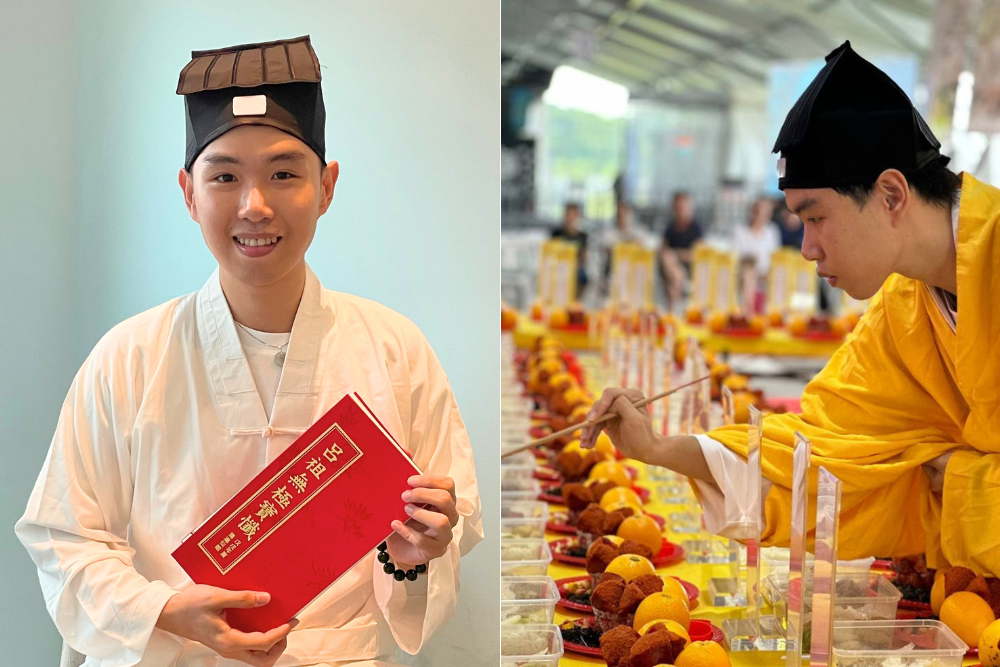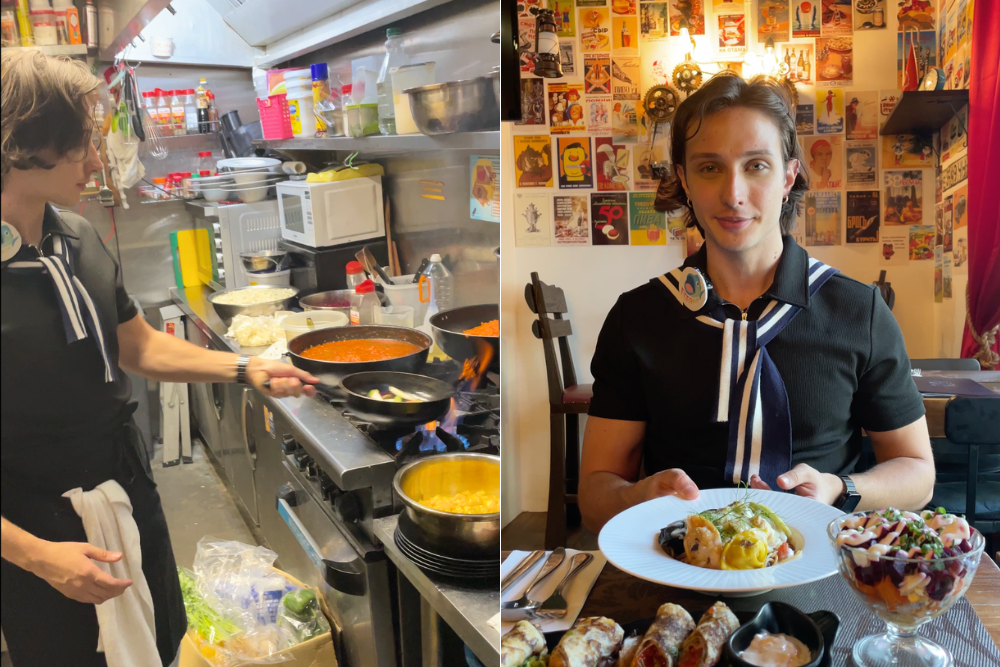We’re not starting a cult but some followers on Instagram would be nice. Thank you.
In the great war of Team Yakult VS Team Vitagen, I have always been firmly on the side of Yakult (Apple flavour for lyfe).
Even if Singapore’s Ministry of Health has deemed Yakult to be worse for me than its closest competitor cuz I’m here for a good time not a long time.

Vitagen ain’t naming names but we know they shady. Image via Vitagen Singapore/Facebook.
Your friendly neighbourhood Yakult Auntie
There is literally no reason for me to be this loyal to a random Japanese cultured milk drink, except they have an edge Vitagen doesn’t have: The Yakult Lady, or what many Singaporeans know as the Yakult Auntie.
Thanks to our neighbourhood’s Yakult Auntie, our fridge in my late grandmother’s flat where I was raised was constantly filled with packs of the drink.
I don’t even remember much about her, only that she would appear and yell “YAKULT!” into the house.
My grandmother would then scurry to the door for a transaction that would inevitably turn into a prolonged chat.
And the fridge would be filled with two five-packs of assorted Yakult flavours after.

Did you know that Singapore is the only market where Yakult produces Apple, Orange and Grape flavours? Image via Yakult Singapore/Facebook
Is this an… international experience?
A few days ago, I came across a video by TikTok user jk_lovett (jk_lovett_korea) on Yakult Ajummas (aunties) in Korea, who ride refrigerated carts to peddle the fermented milk drink from door to door.
@jklovett_korea USA ice cream truck vs. South Korea #korea #koreanculture ♬ original sound – jk_lovett
In 2019, Korea Yakult changed the name from Yakult Ajumma to “Fresh Managers”, although most Koreans continue to use the former.
As it turns out, the Yakult Auntie experience isn’t unique to Singapore or Korea.
Check out the comments section of the video:

Starting with the home of Yakult – Japan.

From Malaysia.

To Indonesia.

To the Philippines.

To as far as Brazil.

And Mexico.

And of course Singapore.
A brief history of the Yakult lady
Based on my intensive research into the comments section, it became apparent to me that the Yakult Lady is a shared experience across several countries and cultures.
So I embarked on a mission to find out about how these ladies came to be.
The beginning
According to Yakult Japan, the first Yakult Ladies made their deliveries in Japan in 1963, though the drink has existed since the 1930s.
The Yakult Lady model was inspired by Nippon Insurance’s strategy of utilising WW2 widows to “create a door-to-door sales force of respectable women in need of employment”.
Their job, the site says, is to “visit customers’ homes and offices to deliver Yakult products and provide health information”.

Image via Yakult Japan.
As of 2020, the South China Morning Post reports, there are more than 80,000 Yakult Ladies in the world, with approximately 35,000 based in Japan alone.
Expansion to South Korea
Then came the 1970s, when the Korean government introduced subsidies to promote their livestock industry, leading to a growing cow business, and as a result, more milk.
This was a problem, because Korean consumers were not receptive to dairy products.
In response, Korea Yakult, in a joint venture with Yakult Honsha of Japan decided to introduce Yakult—a probiotic drink with lactic acid bacteria—to the public.
And in 1971, a few dozen women looking to supplement their household income became the first Yakult Ajummas.
@discoverkorea ‘Yogurt Ladies’ of South Korea, simply known as a “yakult ajumma.” She sell yakult — a sweet, drinkable yogurt!! ❤️#discoverkorea #seoultravel #localtripseoul ♬ Hey, Mickey! – Baby Tate
But these ajummas are just a few of the large wave of women who joined the workforce in the 1970s.
These women often took on jobs as street vendors, restaurants workers or any other available jobs, motivated by the desire to help pay for their children’s education, and elevate their family status.
According to the The New York Times, they were sometimes seen as “aggressive”, and flouted traditional gender roles that expected women to be shy and home-bound.
Jeon Deuk-soon, who started the job after her husband’s business failed, said that her income from selling yakult helped her raise two sons.
Han Hye-ok (pseudonym), a Yakult Lady of 30 years said to ILDA, a South Korean “feminist journal”, in a 2014 interview:
“There were hardly any day care centres then, and I could carry my baby around on the electric cart while I was working. My house was in my section, my sales area, so I could take a break and make dinner for my kids—there were no other jobs like that.”
With flexible hours and commission-based pay, the job continues to be popular with women with childcare responsibilities today.
Yakult ladies around the world
Here in Singapore, there are more than 350 Yakult Ladies as of 2020.
The Yakult Lady scheme in Singapore started in 1986 with an initial group of seven, all of whom were housewives in their 30s.

A Yakult Lady in Singapore. Image via Yakult Singapore.
Today, Yakult Ladies in Singapore make about S$1,000 to S$3,000 per month on average.
During the Circuit Breaker, a partial lockdown imposed in 2020 in response to the Covid-19 pandemic, the Yakult Lady delivery service was halted for two weeks, before being reclassified as an essential service.
In Indonesia, Yakult Ladies—typically married women without an advanced education—contribute to about half of all sales in the country.
Yakult Lady Indonesia #yakult #yakultlady #yakultladyindonesia #cintaiususmuminumyakulttiaphari pic.twitter.com/ug2ACmkk3C
— Yakult Indonesia (@YakultIndonesia) September 22, 2017
According to the Financial Times, Yakult Ladies can make Rp3 million (S$261.44) to Rp4 million (S$348.59) a month in Jakarta, more than the minimum wage of Rp2.4 million (S$209.15).
And in 2018, Thai user Sirasrisa Phanjarikvorapong caused quite a stir when she uploaded pictures of her daughter dressed up as a Yakult Lady for Children’s Day.
Khaosod Online reported that Mimi chose to dress up as a Yakult Lady, rather than a princess like many of her classmates.
Thailand is among one of the 14 countries all over the world with Yakult Ladies.
While the service has taken off in Asian countries Vietnam, India and China, as well as Brazil and Mexico, it has not been as successful in Australia.
SBS Australia reported that the system was disbanded after ten years, as “Australians weren’t comfortable with the idea of a strange woman selling them fermented milk.”
More than just a delivery service
The Yakult Lady system may have failed in Australia, but for many, their favourite neighbourhood Yakult Auntie is more than just another food delivery service.
Chong Wai Yoong, Singapore’s first Yakult Lady, shares that her customers treat her like “one of their own”.
She recounted an incident where two young children were left at home with instructions from their mother not to open the door to strangers.
They let her in to deliver Yakult anyway, with one child reasoning that “the Yakult Auntie is one of our own.”
In Japan, Yakult Ladies have become an important social service for elderly who live alone.
As of 2020, 3,000 Yakult Ladies pay regular visits to more than 37,000 elderly people in Japan as part of the company’s Courtesy Visit Activities.
Korean Yakult Ajummas have been known to help with errands like school bus pickups, watching pets and checking on aged parents.
They are also part of community programs which deliver free milk and yoghurt, and help check on 30,000 seniors living alone.
Top image via Yakult UK & Ireland/YouTube and Yakult Singapore.
If you like what you read, follow us on Instagram, TikTok, Twitter and Facebook to get the latest updates.
More Stories:

How this 24-year-old NUS student & priest is using TikTok to make Taoism more accessible to Gen Zs
Don't tell him to calm down.

She became a couch potato after dropping out of school at 18, but now walks for London & Paris fashion weeks
Who else who could pull off microbangs like that??

‘I just want to do this first before I regret it’: S’pore teacher quits her job to become an OnlyFans creator
Her mother's death was the 'turning point' in making this decision.

‘We’re not going to give up so easily’: 21-year-old drops out of uni & uses TikTok to save his family’s restaurant
And it's working.

Unable to find jobs, Gen Zs in China are returning home to be ‘full-time children’
Not as cushy as it sounds.

Chinese journalist draws flak on Twitter for happy portrayal of Kashgar, Xinjiang in travelogue
Twitter is officially blocked in China.

A TikToker’s pet cat was allegedly confined for 38 hours without food & water by China Airlines
She plans to take legal action with an international lawyer.


